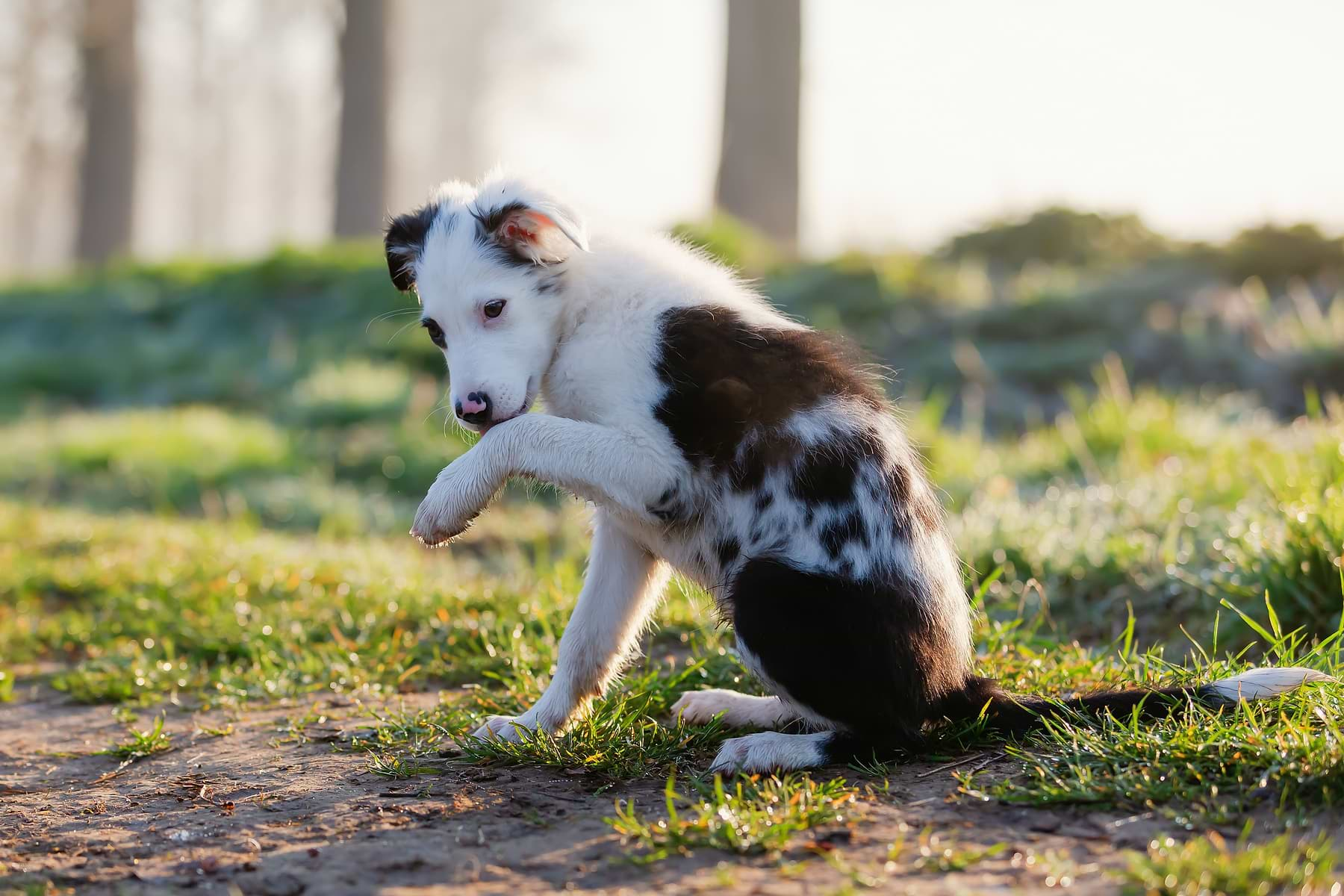If you only notice your dog licking their paws on occasion, it probably shouldn’t be a cause for alarm. However, it can be tricky to tell what qualifies as “occasional” licking and when it becomes frequent.
Most dogs do lick their paws, at least sometimes. This can just be a method of cleaning themselves. If that is the case, there is nothing to worry about. If you would like to double-check, take a look at their paws. Is there any caked-on dirt, or something else that could be causing them to spend more time than usual on the area?
If there is some dirt or grime on your dog’s paw, feel free to take a warm, damp cloth and remove it. Make sure that your dog is alright with having their paws handled, as some pets are touch-sensitive and will not be comfortable with it. If your dog is touch-sensitive, there are helpful methods that you can use to help them get used to being handled.
Since our dogs, unfortunately, can’t use words to tell us how they are feeling, pet parents have to be especially observant. Dogs, as well as many other pets, instinctively conceal pain, illnesses, or any signs of injury. As a result, we should always remain vigilant and know what to look for.
Signs That Something Is Wrong
In terms of more tangible ways that you can assess if your dog’s paw licking is doing damage, you can check to see if they look irritated. Are your pet’s paws hairless in places, or are they red? Does your dog has sores or scabs on their paws?
A bump could be indicative of either an injury or a bug bite that is causing discomfort. When in doubt, it is best to examine your dog’s paws. If you do not feel comfortable doing so, or if you want a second opinion, it might be time to bring your dog to the vet.
Has Your Dog Always Done This, or Is the Behavior New?
In many cases, behavioral changes can be nearly as telling as physical changes when it comes to determining a root issue. If your dog has always licked their paws, and they have not recently started paying any extra attention to them, then everything should be fine.
Meanwhile, if you have not noticed your dog licking their paws until recently, or if there has been a significant uptick in how often they do so, there might be something amiss. Once you have figured out that there is likely an underlying reason for your dog’s paw licking habit, the next step is finding what exactly that reason is.
Now, without further ado, let’s answer the question of why dogs lick their paws.
1. Your Dog Is Just Grooming Themselves
Dogs might not have a reputation as being the cleanest animals on the block, but they do still engage in grooming behaviors from time to time. Unlike cats who spend a large portion of their day grooming themselves, dogs typically only groom if they have a clear reason to. These reasons stem from some kind of dirt, debris, or grime that has attached itself to your dog’s fur.
Taking our dogs on a walk is a wonderful bonding experience, and provides much-needed exercise for our pets. You might have noticed, however, that dogs do not typically wear shoes as we do. Our feet are protected from the elements, but our pets’ paws are not. Due to this, there is often some cleaning that needs to be done after returning from a walk or a trip outdoors, especially on muddy days or after it rains.
If you want to minimize your dog’s licking, you can clean their paws yourself. This will also prevent them from potentially swallowing dirt or anything else that was out on the ground.
2. A Skin Infection
Other than routine grooming, dogs will also tend to their paws if there is something wrong.
A skin infection can occur if a wound was not treated properly, and instead, bacteria spread. Some common signs that your dog’s paw might be infected include:
- Redness
- Swelling
- Itchiness
- Discharge (typically yellow or brown)
- The paw or place of infection is noticeably warm to the touch
Although licking is a way for your dog to make their infection feel better, it can end up doing more harm than good. By licking, your dog is creating a warm and wet environment for bacteria to thrive in and spread even more, possibly worsening the infection.
3. Your Dog Is Feeling Bored
It is also possible that there is nothing physically wrong with your pet, but their mental needs are not being fully met. Despite the fact that that last sentence rhymed, this topic is actually quite serious: boredom in dogs can lead to all sorts of behavioral issues.
If your pet lacks proper mental stimulation, then they could begin looking for it in dangerous places. For instance, it is very common for bored dogs to chew at wires, scratch at couches, and engage in other destructive behaviors. One of these less-than-ideal behaviors is constantly licking their paws.
This might not pose an issue at first, but prolonged licking can lead to irritation. In order to counteract this, you should work on helping your dog feel more entertained throughout the day.
How Can You Help Your Dog Feel More Stimulated?
Some dogs might need oodles of attention and play, while others might be perfectly content to snooze the day away on the couch. This will simply depend on your pet’s personality. That being said, every pet needs mental stimulation.
Without enough mental stimulation, pets can become bored and unhappy. As pet parents, it is up to us to look after our dogs’ physical and mental well-being.
Think about your dog’s toys. Do they have enough of them? If so, is there a wide enough variety of kinds of toys? For your dog to be fully engaged, they should have a plethora of different types of toys to choose from. Whether they want a chew toy, a toy to snuggle with, or a puzzle toy made for mental stimulation, they should have options.
A bored dog might also be in need of more exercise. A brisk and engaging walk around the neighborhood or a local park is effective for several reasons. For one, it gets your dog the exercise that they need to feel fulfilled and tired at the end of the day.
Also, going on a walk will expose your dog to plenty of new sights, sounds, and smells. These exciting experiences will keep your dog entertained.
4. An Allergic Reaction
Just like humans, dogs can experience the woes that come with allergies. Dog allergies often manifest in itchiness, especially around the paws. Some of the most common dog allergies include:
- Certain kinds of food
- Dust
- Pollen
- Grass
- Household cleaners
5. A Means of Self-Soothing
When your dog is feeling uncomfortable or stressed out, they might start licking their paws in order to calm themselves down. Try to identify what could be scary about their current situation. If at all possible, remove that stimulus. If it is not possible, you could give them a calming toy or a high-reward treat.
Better yet, you could also give your dog a safe space of their own in the form of a cozy crate.
6. An Injury or Pain
If a dog is feeling discomfort or pain in their paws, they might lick the affected area. Inspect your dog’s paws to check for any abnormalities, or consider bringing them to the vet for a visit.
7. Fleas
Pesky fleas can attempt to make a meal of your dog, and their paws are no exception. If you notice tiny black dots on your dog’s paws, they could be fleas. Even if the dots do not appear to be moving, this could be evidence of their droppings.
Paw-sitively Perfect
There are a number of reasons that dogs might lick their paws. By keeping a vigilant and caring eye on our pets, we can make sure that they will stay comfortable, healthy, and happy.
Sources:
Why Does My Dog Lick Their Paws? | American Kennel Club
How To Recognize Signs of Pain in Your Pet | Vet Specialists
A Mentally Stimulated Dog Is a Happy Dog | American Kennel Club

The Diggs Team
We believe our dogs deserve safer, better designed pet products.
You might also like
Crate training tips, stories and inspiration
View all blogsIn Your Diggs
Share your photos with #DiggsPet and tag us @DiggsPet on IG and TikTok.



